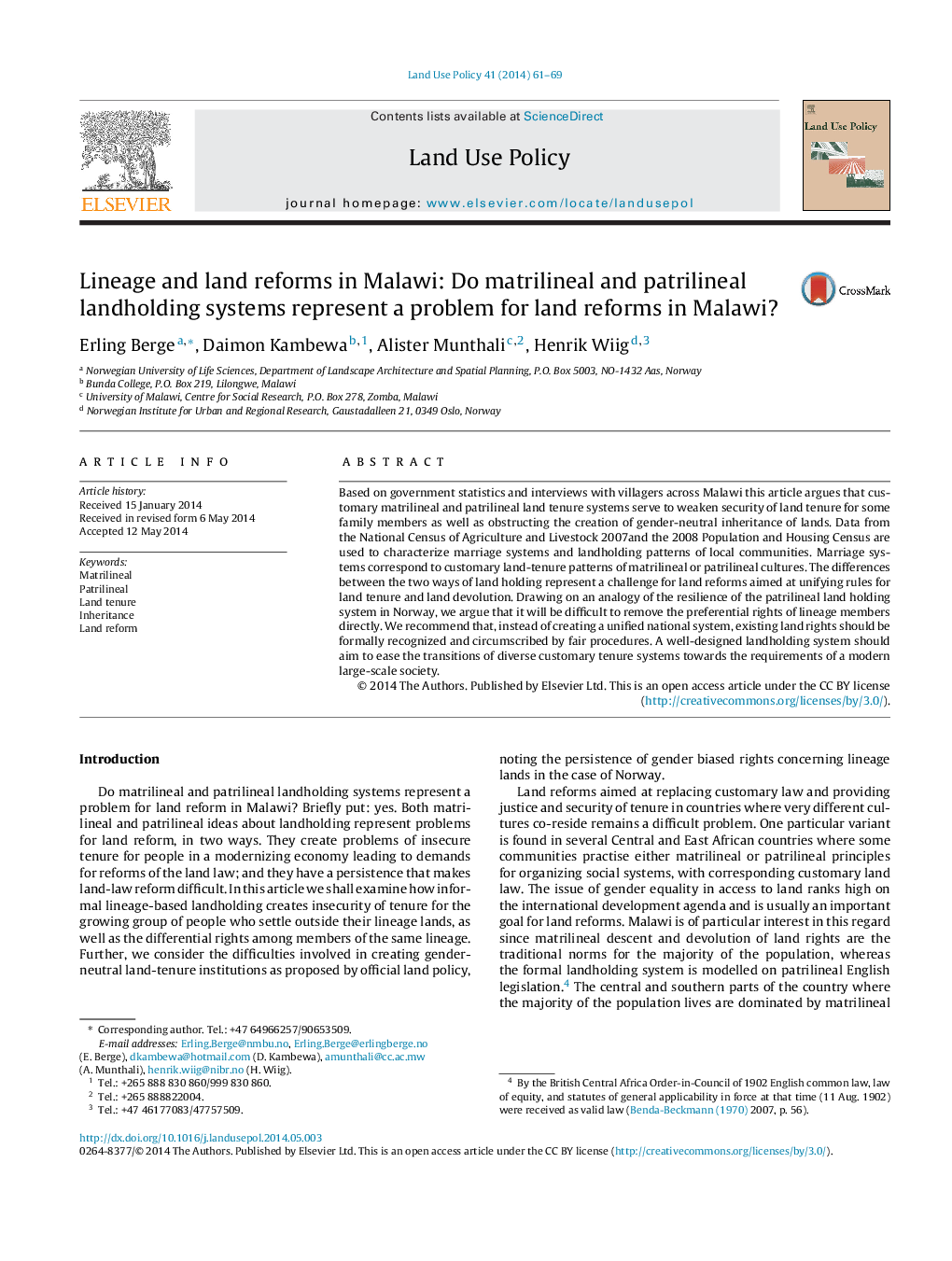| کد مقاله | کد نشریه | سال انتشار | مقاله انگلیسی | نسخه تمام متن |
|---|---|---|---|---|
| 6548422 | 160104 | 2014 | 9 صفحه PDF | دانلود رایگان |
عنوان انگلیسی مقاله ISI
Lineage and land reforms in Malawi: Do matrilineal and patrilineal landholding systems represent a problem for land reforms in Malawi?
ترجمه فارسی عنوان
اصلاحات خطی و زمین در مالاوی: آیا سیستم های مالکیت ماتریالیال و ماتریالیال مشکلی برای اصلاحات ارضی در مالاوی است؟
دانلود مقاله + سفارش ترجمه
دانلود مقاله ISI انگلیسی
رایگان برای ایرانیان
ترجمه چکیده
بر اساس آمار دولتی و مصاحبه ها با روستاییان در سراسر مالاوی، این مقاله استدلال می کند که سیستم های مالکیت زمینی ماتریالین و ماتریالیسم معمول، به منظور تضعیف امنیت اقامت زمین برای بعضی از اعضای خانواده و همچنین مانع ایجاد مرزبندی جنس ناپذیر زمین ها می شوند. داده های سرشماری ملی کشاورزی و دامداری 2007 و سرشماری جمعیت و مسکن 2008 برای توصیف سیستم های ازدواج و الگوهای مالکیت محلی در جوامع محلی استفاده می شود. سیستم های ازدواج به الگوهای معمول تصدی مالکیت زمین از فرهنگ های ماتریالیال یا پاتریالیال متصل می شوند. تفاوت بین دو روش اجاره زمین، یک چالش برای اصلاحات ارضی است که هدف آنها ادغام قوانین برای مالکیت زمین و اداره زمین است. ما بر این اساس استدلال می کنیم که حق الزحمه های حقوقی اعضای تناوبی را به طور مستقیم از بین می برد. ما توصیه می کنیم که به جای ایجاد نظام ملی یکپارچه، حقوق زمین موجود باید به طور رسمی به رسمیت شناخته شده و با روش های منصفانه محدود شود. یک سیستم مالکیت به خوبی طراحی شده باید با هدف تسهیل انتقال سیستم های متنوع اداری معمول به سمت نیازهای یک جامعه مدرن در مقیاس بزرگ باشد.
موضوعات مرتبط
علوم زیستی و بیوفناوری
علوم کشاورزی و بیولوژیک
جنگلداری
چکیده انگلیسی
Based on government statistics and interviews with villagers across Malawi this article argues that customary matrilineal and patrilineal land tenure systems serve to weaken security of land tenure for some family members as well as obstructing the creation of gender-neutral inheritance of lands. Data from the National Census of Agriculture and Livestock 2007and the 2008 Population and Housing Census are used to characterize marriage systems and landholding patterns of local communities. Marriage systems correspond to customary land-tenure patterns of matrilineal or patrilineal cultures. The differences between the two ways of land holding represent a challenge for land reforms aimed at unifying rules for land tenure and land devolution. Drawing on an analogy of the resilience of the patrilineal land holding system in Norway, we argue that it will be difficult to remove the preferential rights of lineage members directly. We recommend that, instead of creating a unified national system, existing land rights should be formally recognized and circumscribed by fair procedures. A well-designed landholding system should aim to ease the transitions of diverse customary tenure systems towards the requirements of a modern large-scale society.
ناشر
Database: Elsevier - ScienceDirect (ساینس دایرکت)
Journal: Land Use Policy - Volume 41, November 2014, Pages 61-69
Journal: Land Use Policy - Volume 41, November 2014, Pages 61-69
نویسندگان
Erling Berge, Daimon Kambewa, Alister Munthali, Henrik Wiig,
